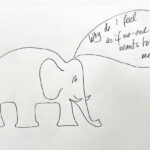ea BlogJam
Say it like it is – and Give those Elephants a Break

So here we are at the Trust is Us leadership conference with a full tally 150+ middle to senior leaders in attendance. Inclusivity is high on the agenda. My colleague from the ea and I are taking in the room, and there, holding their breath in the aisle against the walls, are the Five Elephants. This is what I learned when lending them my ear.
1. Who is Missing?
The first Elephant jumped in blazing with indignation: when it comes to inclusion, people are very sensitive about colour and ethnicity – so they should be. But sensitive and thoughtful, not touchy and reactive. But it seems we have become so jumpy around questions of ‘race’ (often in a way that is far from helpful for racial equality) that we risk completely ignoring its intersections with other important characteristics, such as gender, disability and class? Here at Trust is Us, the organisers had not one request from delegates for any reasonable adjustments. Really?! 150 adult human beings and not one with access needs? How did that happen…? Using a gender lens: what is going on in this organisation’s system so that women are 4/5 of the delegates, but there is only one woman out of 5 panel members? I then got wondering how many of panel members were Oxbridge or Russell Group graduates; and what was faith, religion or belief profile of the delegates, and did they have any needs regarding diet or worship?
The delegate and speaker make-up of any conference, just like the make-up of middle and senior management, provides rich object lessons in inclusion. It’s not just a matter of representational statistics (if I had a penny for each time I have heard how ‘we must reflect the communities we serve’…). Representation can help, but it’s very limited in the absence of a commitment to equity, coupled with diversity awareness and ‘literacy’. Our current cabinet, possibly the most diverse in history (at least with regard to race and gender) is a case in point: I do not notice a huge enthusiasm for diversity equity and inclusion amongst His Majesty’s Government ministers.
The point about representational data (equality monitoring) is that it is a doorway to recognising the barriers faced by the ‘minoritised majority’: the ‘majority’ we are always labelling ‘minorities’. Let me explain: women / working class / Black & people of colour / disabled people / LGBTQ+ / people of non-Christian faith taken together are a majority of society. But they are by-and-large far from the majority of those occupying leadership positions, even in the public sector – the top seats being mostly reserved for people drawn from a minority of the population: who are an intersectional combination of white, non-disabled, middle class, Christian or Christian background heterosexual men of 40 and over. Yes, I know there are exceptions – as the current UK Cabinet aptly demonstrates, but they only point up the general rule. It’s a rule – by the way – that seems to be most readily breakable by people who buy wholesale into the same values and priorities as their ‘minority’ counterparts.
None of this is rocket science: let’s take the disability stat for starters. According to ONS there are 4.9 million disabled people in a UK workforce of around 28.5 million – roughly 17%. Using this as a crude proportion, if there were no barriers to progression of disabled people in the workplace, we’d expect about 26 disabled people at the conference. Out of these a significant proportion would be D[1]/deaf or visually or physically impaired. In a conference context not specifically designed for their needs, surely some of these individuals would require reasonable adjustments?
Logic leads us to consider then, that either there were a number of disabled colleagues present who did not ask for reasonable adjustments; or disabled colleagues were only able to ‘speak’ through their absence – from the room and/or from the ranks of managers and leaders that fed the room. Either way, as leaders committed to inclusion, should we not be disturbed enough by the apparent absence of disabled colleagues to highlight and address it up front? Without them we not only have a deficit of talent. We are also risk being impoverished in our understanding of the needs of disabled staff and customers/service users/patients.
2. ‘Rank’ Reversal
The second Elephant was deep into complexity. I was reminded of what I had I learned from my Process Work facilitation training about how a person’s standing – or ‘rank’ – in a system is the result of many factors, including – but not exclusively – their job role or grade. Other factors, such as personality, gender, ethnicity, education, colour, networks, style also, overtly or covertly, operate to elevate – or put constantly question – their position. The culture of a system is strongly informed by the ‘types’ that the system tends to elevate, and the experience of that culture is strongly flavoured by the micro-behaviours people embody and navigate day after day, which confront us with experiences of favour or disfavour to which we have to respond.
What we have found consistently in our work is that, however loudly organisations promote inclusion, it is almost always the case that people are able to rise into senior leadership positions without more than the most basic literacy in diversity, inclusion and equity. Often that literacy includes precious little awareness of their own diversity co-ordinates. More often than not, senior leadership positions are recruited to by head hunters / executive search firms which, despite charging very considerable fees for their services, seem rarely to select highly DEI literate candidates for what are apparently very competitive selection processes. That may not be surprising. What is surprising, particularly in a public sector that by definition serves the whole of a highly diverse population, is that this state of affairs is tolerated by organisations that say they are committed to DEI. This is a whole subject area in itself – and as such the topic of a different piece!
However, the perverse consequence of this toleration of low diversity literacy among senior people, is that those who should provide leadership and ‘walk the talk’ on inclusivity are often underqualified for this role. Even if they have a rudimentary grasp of ‘correct’ language and appropriate sound bites to create the right headlines on DEI, you don’t have to scratch very deep to find that many senior leaders go through their careers carrying a thinly disguised bundle of fears, anxieties, shame and embarrassment about their lack of DEI competence. It’s a phenomenon sadly familiar to people lower down the organisation for whom DEI is a daily digest of experiences & practices – a lifelong learning journey in which they seek to influence colleagues, teams and the system in the direction of equity and inclusivity.
It’s not just that senior leaders are so often the beneficiaries of unrecognised systemic privileges – of class, gender, disability, race, ethnicity etc. True, this can put them at a disadvantage when it comes to living and embodying a genuine, palpable and heartfelt commitment to equity and inclusion as it plays out in the fine grain of moment-by-moment interactions. Paradoxically, the more oppression and exclusion one has had to navigate, the more skilled one is at recognising, identifying and navigating its currents – and the less likely one is to attain the higher ranks of any mainstream organisational system.
However, while privilege sets a higher bar, it does not in itself disqualify a person from leading inclusively – far from it. Privilege is a gift, which once acknowledged can be generously shared. It is not mainly our diversity characteristics that determine our suitability for leading on inclusion – it is our hard-won skills of conscious leadership practice: that means leadership of Self, Relationships and System with a DEI lens – not as an optional viewpoint, but firmly housed in our outlook (and in-look) at all times.
The consequence of the ‘rank reversal’ in inclusivity expertise can be a perverse dynamic around the leadership of organisations: those who are supposed to lead inclusively are embarrassingly inept at doing so. Those with the skills, knowledge and understanding burn out from doing mostly unpaid and undervalued work to promote DEI in the system, and go mostly unrecognised for what can amount to a whole career of research, engagement, effort and activism.
When the two parties collide, the sight is unseemly – people who could write a doctorate on the experience of exclusion trying to have a meaningful conversation with those with ten times their pay packet who are still in junior school. The unspoken interpersonal dynamic could be cut with a knife – anger, eloquence, knowledge and passion on the one side; awkwardness, embarrassment, and fear of exposure dressed as numbness or blandness on the other.
I risk caricaturing the elephant of ‘Rank Reversal’, but it is in service of lived personal and professional experience: anyone who has worked as we have for decades in this field will recognise this pattern and actually or metaphorically find their head in their hands recalling the hundreds of times they have witnessed such moments and prayed never to again.
3. Confusing Power with Authority
The third Elephant was old and wise, and introduced me to Dr Mary Graham, an aboriginal legal scholar who is Adjunct Associate Professor at the University of Queensland, and speaks eloquently about the difference between aboriginal and western legal systems. One of Dr Graham’s points which made me sit up, is that in aboriginal systems of law and governance, power and authority are separated: elders of the people may have tremendous authority due to their life experience and years of practice. However, they do not have the power to impose their wisdom on others, because all others in the system are autonomous persons who forge their own courses of action.
Our organisational systems are quite different: leaders seems to have both power and authority vested in them. When this works well, one could argue that it is not so bad. But it places a heavy weight of responsibility on the leader and sets them up for dictatorship or failure. More often than not, those in power have large areas of the leadership repertoire in which they do not actually embody the authority required to exercise their power legitimately. DEI is more often than not one of those areas.
If I go back to my early years as a DEI consultant, at the start of the new Millennium, with the MacPherson Report to the Stephen Lawrence Inquiry ringing in everyone’s ears, I can recall an example of this with visceral vividness. Like lambs queueing up for a barbecue in a lions’ den, with only our intellectual and moral qualifications for protection, my colleagues and I paired up to face the vitriol and wrath of rank-and-file police officers incensed at being ‘sold out’ by their senior leaders’ admission that there was institutional racism in our police forces.
There is a lot I could say about those experiences, but my point here is that those senior police leaders had the power to require their officers to turn up at the training – after all, disobeying orders is as hazardous in the police as in the army. But they did not have the authority to win the respect of their officers, let alone the open hearts and minds required for the training to be successful. We were the lambs to the slaughter.
As I reflect upon this, I can see that, however well-meaning we trainers were, all we ended up doing was reinforcing the perverse dance of diversity avoidance with our presence in the room – for which we paid a high personal price, as the system incentivised participants to target us with their rage.
Building legitimate authority is far harder than exercising the power of coercion. It requires courage, boldness and humility. It requires compassion, empathy and clarity. It requires lived knowledge: most of all the wisdom that comes from ‘walking one’s own talk’.
4. ‘Talk’ without ‘Walk’
The fourth Elephant asked us to observe the room and ask: ‘what are people really doing here?’ There we were with five esteemed panellists, all senior leaders in the system, talking about some really interesting topics, such as:
- How Trust is Us providers need to think beyond the ‘four walls’ of the institution
- How to address health inequalities
- How communities need to be included in decision-making about things that seriously affect them
- How it comes to be that racism is still a daily experience for the one woman of colour on the panel – but she rarely speaks about it
Looking around me, I wondered why I felt deflated and uninspired despite the apparent relevance the talk. That’s when the fourth Elephant piped up: ‘It’s the walk, stupid!’. We were ‘talking about’, but not living, inclusion.
Perhaps the most damaging dynamic of all in the question of inclusive leadership is the disconnect between ‘Talk’ and ‘Walk’ – this is the terrain where a leadership credibility fault-line opens up and grows and the gap becomes populated with the invasive weeds of scepticism, apathy, reaction and cynicism. Trust is lost and hard to regain.
Here is what the fourth Elephant had to say:
- Why does the panel consist of system leaders –not leaders in the community outside the ‘four walls’ of the institution, who are the end users of the services?
- Where are the poets, the activists, the service users themselves, the non-English speakers, the recent UK arrivals, the young people, the other agencies that serve them?
- Where is the passion, the drama, the lived experience and the deep quiet reflection that seeks and finds the pressure of the magma that is seeking change and gives it a channel through which to flow into the world and make new ground, new soil, new realities?
5. What about me?
Finally, the fifth Elephant looked me in the eye and asked me what I was doing there. Reflecting upon my own role I was forced to ask whether my colleague and I, leadership consultants from outside the region, were really a better choice to lead a workshop than a local youth group or mother and toddler group or city farm or housing co-op, who could speak to the experiences of the people actually trying to access what, after all, belongs to all of us, because we pay for it and we elect the people who are meant to choose the best leaders to lead it.
We had certainly brought significant skills, questions and challenges to the event, but had we really done enough with our privileged position? Without in any way dismissing our contribution (which was very well received), or our skills and experience, which have been decades in the making, this remains for me an open question. We can certainly contribute to conversation spaces, conferences, learning inputs and coaching relationships which work from the inside out to build courage, compassion and wisdom in systems. But I cannot help wondering whether it would have been better to engage us to help develop the overall concept and programme for the event, rather than simply provide a fascinating and well-received workshop with no follow-on.
The fifth Elephant encouraged me not to look for simple answers, but to keep inquiring, within and without, repeating the mantra: ‘I am part of the terrain, and therefore part of the problem –and part of finding solutions. I accept that I don’t know it all. I offer my best and hope to be useful’.
References: Dr Mary Graham Processworks UK
[1] We recognise that many Deaf people do not consider themselves disabled, but we are using ONS statistics, which do count deafness as ‘a disability’







